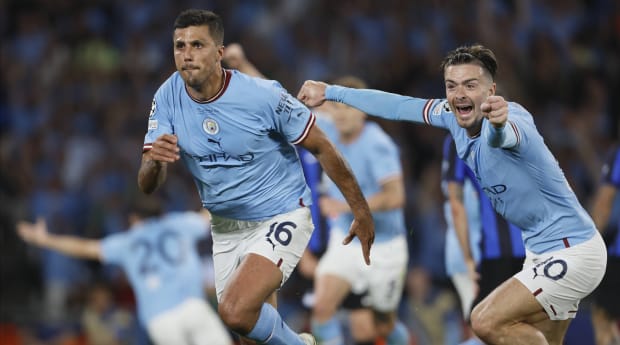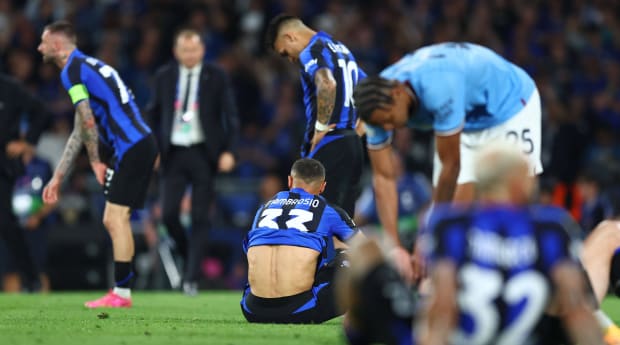This was a very significant day in the history of Manchester City, and a very significant day in the history of football. Rodri’s 68th-minute strike brought City’s first Champions League and made it only the second side in English history to complete the treble with a 1–0 win against Inter Milan. But as nation states invest more and more into sport this was also a red-letter day: The first time a state-run club has won Europe’s premier competition.
How much did this mean to City? It mattered enough for Sheikh Mansour, the club owner and deputy prime minister of the United Arab Emirates, to turn up for his first game since a 3–0 win over Liverpool in August 2010. His brother, Mohamed bin Zayed, the president of the United Arab Emirates, was alongside him in the VIP area. This was evidently a great day for Emirati sport.
For Abu Dhabi, for City, this was the culmination of the project. And for football there is reason for unease. The success of a petroclub has been expected for some time— presaged, even, by the two Champions League titles Chelsea won under Roman Abramovich, an oligarch acting with state-backing—but that doesn’t lessen the significance of this moment. It’s a long time since football was a noble or innocent game, but this is a further step into the darkness, not only because of the human rights records of the states in question but because the states are essentially ungovernable by the football authorities.

IMAGO/Sportsphoto
Inevitably there must be longer-term concerns. How sustainable, really, is this? Football is now operating beyond the usual laws of the market, the state-run clubs sustained only by generous sponsorship deals with other state-run entities. The rest cannot compete and will not be able to until the states lose interest. It happened with China, which has caused problems for Inter, which is co-owned by Suning. But with Saudi Arabia stepping up its interest, effectively nationalizing the four biggest clubs, buying Karim Benzema and N’Golo Kanté to join Cristiano Ronaldo in the Saudi league and vying to host the 2030 World Cup, there is little sign of Gulf enthusiasm for football waning any time soon.
But those are distant concerns. More immediate on Saturday was the issue of getting to the stadium. The new metro system, perhaps, meant things were not quite as bad as when Istanbul last hosted the final in 2005, but this is not a stadium equipped to host a game of this magnitude. Once again, queues of traffic stretched unmoving down the approach road as fans who had abandoned their taxis and buses trudged the final miles. A pall of smoke from a factory fire a mile or two from the stadium added to the apocalyptic mood.
As long as five hours before the game, queues to board the shuttle buses to the stadium were two hours long. UEFA had told fans to set off from central Istanbul nine hours before kickoff, a statement that is in itself an admission of inadequacy. How can this be UEFA’s premier event of the year? How can it, yet again, let fans down, just as it did in Paris last year?
Not that City fans, in the glow of victory, will be too worried by that. This was not a great City performance. In terms of aesthetics, this was a long way behind either of Guardiola’s previous victories in the competition with Barcelona. But 12 years after his last triumph, as Guardiola became only the fourth manager to win a fourth European Cup/Champions League, that perhaps will not bother even the great perfectionist. Part of the logic of signing Erling Haaland was that City would be able to win ugly, that it would be able to win games without having to dominate them.

IMAGO/GEPA pictures
This was an ugly, disjointed game. For a long time, Inter frustrated City, without ever really offering too much of a threat itself. Kevin De Bruyne, City’s main creative presence, was forced off with what appeared to be a hamstring injury after 34 minutes, a moment of particularly rotten luck given he suffered a fractured cheekbone in the 2021 final and had to be replaced on the hour.
But eventually the gradual pressure told. Manuel Akanji slipped in Bernardo Silva and his cross was deflected into the path of Rodri, who side-footed a shot from the edge of the box just inside André Onana’s left-hand post. Federico DiMarco did subsequently head against the bar, his follow-up them being blocked by Romelu Lukaku, and Lukaku then put a free header straight against Ederson. But City, living on its nerves, held out.
And so a fourth successive Champions League final finished 1–0, City has its grail, Guardiola climbed to the next tier of the pantheon and football entered a new and unwelcome age.







